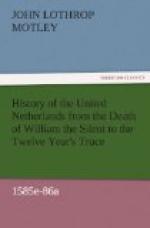The envoy accordingly, in name of the Earl, expressed the deepest gratitude for this mark of the affection and confidence of the States-General towards the Queen. He assured them that the step thus taken by them would be the cause of still more favour and affection on the part of her Majesty, who would unquestionably, from day to day, augment the succour that she was extending to the Provinces in order to relieve men from their misery. For himself, the Earl protested that he could never sufficiently recompense the States for the honour which had thus been conferred upon him, even if he should live one hundred lives. Although he felt himself quite unable to sustain the weight of so great an office, yet he declared that they might repose with full confidence on his integrity and good intentions. Nevertheless, as the authority thus offered to him was very arduous, and as the subject required deep deliberation, he requested that the proposition should be reduced to writing, and delivered into his hands. He might then come to a conclusion thereupon, most conducive to the glory of God and the welfare of the land.
Three days afterwards, 14th January, the offer, drawn up formally in writing, was presented to envoy Davison, according to the request of Leicester. Three days latter, 17th January, his Excellency having deliberated upon the proposition, requested a committee of conference. The conference took place the same day, and there was some discussion upon matters of detail, principally relating to the matter of contributions. The Earl, according to the report of the committee, manifested no repugnance to the acceptance of the office, provided these points could be satisfactorily adjusted. He seemed, on the contrary, impatient, rather than reluctant; for, on the day following the conference, he sent his secretary Gilpin with a somewhat importunate message. “His Excellency was surprised,” said the secretary, “that the States were so long in coming to a resolution on the matters suggested by him in relation to the offer of the government-general; nor could his Excellency imagine the cause of the delay.”
For, in truth, the delay was caused by an excessive, rather than a deficient, appetite for power on the part of his Excellency. The States, while conferring what they called the “absolute” government, by which it afterwards appeared that they meant absolute, in regard to time, not to function—were very properly desirous of retaining a wholesome control over that government by means of the state-council. They wished not only to establish such a council, as a check upon the authority of the new governor, but to share with him at least in the appointment of the members who were to compose the board. But the aristocratic Earl was already restive under the thought of any restraint—most of all the restraint of individuals belonging to what he considered the humbler classes.




